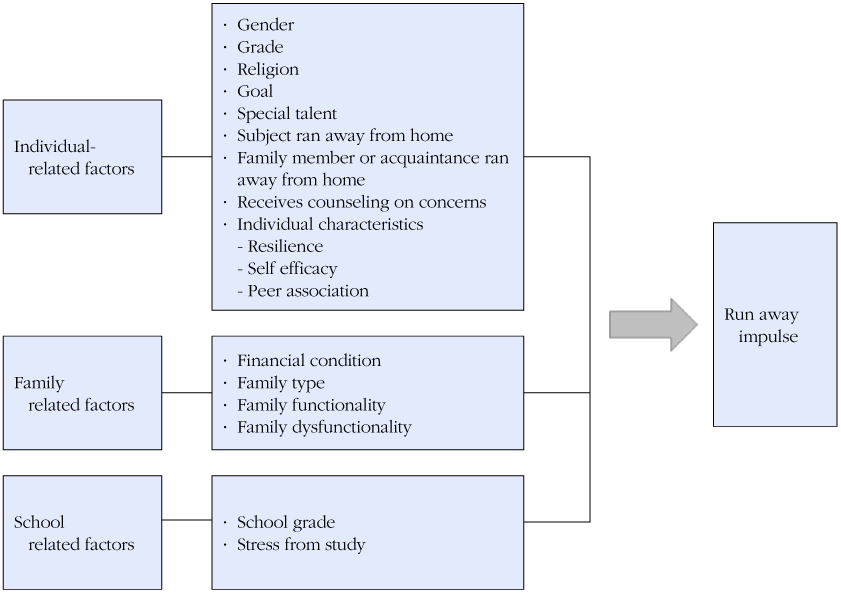J Korean Acad Community Health Nurs.
2012 Mar;23(1):1-12. 10.12799/jkachn.2012.23.1.1.
Factors Influencing Run Away Impulse in Early Adolescents
- Affiliations
-
- 1Red Cross College of Nursing, Chung-Ang University, Seoul, Korea. placebo72@hanmail.net
- KMID: 2292812
- DOI: http://doi.org/10.12799/jkachn.2012.23.1.1
Abstract
- PURPOSE
This study carried out a preliminary analysis of available literature and used the ecological approach to define a research hypothesis with focus on individual, family, and school variables related to early adolescents' urge to run away. This study also aimed to examine the influence of each of these variables in order to build a forecast model showing which variables have more influential on early adolescents' urge to run away.
METHODS
Materials were collected from 433 male and female fifth- and sixth-grade students at two schools in Gyeonggi Province. Analysis was carried out using SPSS/WIN 18.0. Frequency analysis, chi2-test, t-test, correlation analysis and logistic regression analysis were conducted.
RESULTS
The results indicate that personal factors related to runaway impulse are gender and previous runaway attempts, family-related factor family functionality, and school-related factor the area of stress from study.
CONCLUSION
Based on the study results as above, individual, family, and school interventions need to be developed.
Keyword
Figure
Reference
-
1. Oshio A, Kaneko H, Nagamine S, Nakaya M. Construct validity of the adolescent resilience scale. Psychol Rep. 2003. 93:1217–1222.2. Choi HJ. Family functioning and stress coping strategies of non-delinquent and delinquent adolescents. 2004. Seoul: Kyunghee University;Unpublished doctoral dissertation.3. Chung HK. A forest model on runaway youth. 2000. Seoul: Chungang University;Unpublished doctoral dissertation.4. Chung HK, Ann OH. Predicting factors on youth runway impulse. Korean J Child Health Nurs. 2001. 7:483–493.5. Davey M, Eaker DG, Walters LH. Resilience processes in adolescents: Personality profiles, self-worth, and coping. J Adolesc Res. 2003. 18:347–362.6. Han SC. Exploration on risk and protective factors of adolescent runaway. Korean J Psychol Soc Issues. 2008. 14(1):273–298.7. Heo SH. A study on the influences of parents factors on adolescents'; Runaway impulse. 2009. Seoul: Sungkyunkwan University;Unpublished master's thesis.8. Hong SH, No UK, Park MS. Identifying latent classes in adolescents' runaway frequency changes and testing eco-system variables as determinants of the classes. Korean J Youth Stud. 2010. 17:181–201.9. Ji SH, Lee EK, Lee JE, Choi SM, Chung CS, Lee SY. Longitudinal study for strategic interventions and preventing delinquency of Adolescents (II). 2002. Seoul: Korea Youth Counseling Institute.10. Jun SH, Kim WK, Hwang SH. Interactional theory as an approach to adolescent runaways: A partial test of Thornberry's theory. Stud Korean Youth. 2010. 21(4):31–50.11. Kim KH, Kwon HJ, Kim HY, Lee JH, Kim SK. A study on the variables affecting high school girls' smoking experience. Korean J Youth Stud. 2004. 11:339–362.12. Kim JS, Kim HA. A study on factors affecting the experiences of runaway youths and the runaway impulse. Korean J Hum Dev. 2008. 15:73–94.13. Kim SJ. A study on the influences of the stressors from school on problem behavior in middle school and high school students -focusing on the stress coping strategies-. 2002. Seoul: Yonsei University;Unpublished master's thesis.14. Kim YJ. Psychological adjustment for risk factor and protective factor of runaway adolescents. 2004. Seoul: Seoul National University;Unpublished master's thesis.15. Lee JH, Kim KH, Kim HY, Chung HK. A study on the variables affecting high school girls' runaway experience. Korean J Youth Stud. 2006. 13(3):161–179.16. Lee SJ. The effects of self-concept enhancement program on establishing positive self-concept of children with learning disability and on the consciousness of classmate. 2002. Gyeonggi: Kangnam University;Unpublished master's thesis.17. Lee SY. The effects of family-environment on school adjustment of adolescents: Mediating effect of egore-siliency, academic, academic stress, mental health. 2010. Seoul: Seoul Womans University;Unpublished doctoral dissertation.18. Min DI. The effects of family strengths, school life health and ego-resilience on mental health of adolescents. 2007. Inchon: Inha University;Unpublished doctoral dissertation.19. Ministry of Gender Equality & Family Republic of Korea. Teenage runaway research news. 2010. 10. 22. Retrieved November 23, 2010. from http://www.mogef.go.kr/korea/view/news/news03_01.jsp?func=view¤tPage=0&key_type=&key=가출&search_start_date=&search_end_date=&class_id=0&idx=457858.20. Ministry of Government Legislation. Framework act on juveniles. 2010. Seoul: Ministry of Gender Equality & Family Republic of Korea.21. Nam HM. The effects of psychological family environment, self-control and friends characteristics of middle school students on their problem behaviors. 1999. Seoul: Seoul National University;Unpublished master's thesis.22. Nam MA, Hong BS, Yang HJ. Survey on the runaway adolescents and Korea youth shelter. 2007. Seoul: Korea Youth Shelter Association.23. Nam YO. A study on the influences of borderline personalities on adolescents' runaway. Korean J Youth Stud. 2001. 8:143–172.24. National Youth Police Institute. Korean survey on the run away of youth and children in 2009. 2011. 01. 17. Retrieved February 10, 2011. from http://archive.nypi.re.kr/sub.asp?BID=B19&idx=1204&BoardType=view&page=1&Search_m=&Search_t=&Mcode=B020020.25. Oh SH. A study on determinants of adolescents' adaptation in low income broken family. 2001. Seoul: Seoul National University;Unpublished doctoral dissertation.26. Oh SH. The study on the eco-systemic variables affecting youth runaway-focus on the runaway impulse and runaway experience. J Adolesc Welf. 2010. 12:301–324.27. Park JS, Hwang SH. A study on the mediating effects of runaway impulse influencing adolescents' runaway. Korean J Youth Stud. 2010. 17(10):1–21.28. Park SH. Study on the relationship among ego resilience, failure tolerance and school adjustment of elementary school children. 2010. Cheongwon: Korea National University of Education;Unpublished master's thesis.
- Full Text Links
- Actions
-
Cited
- CITED
-
- Close
- Share
- Similar articles
-
- Comparison of Self-esteem, Perceived Life Satisfaction, Depression and Aggression According to Experience of Suicidal Impulse in Adolescents
- Predicting Factors on Youth Runaway Impulse
- Comparison of the Factors Influencing Young Adolescents' Aggression according to Family Structure
- Factors Influencing Cell Phone Addiction in Adolescents
- Factors Influencing Sexual Permissiveness in Adolescents


